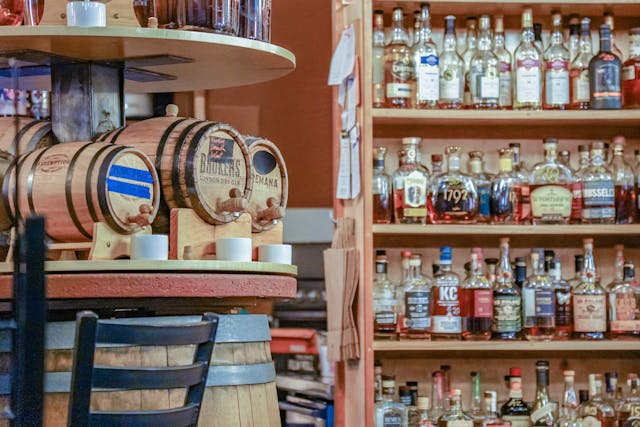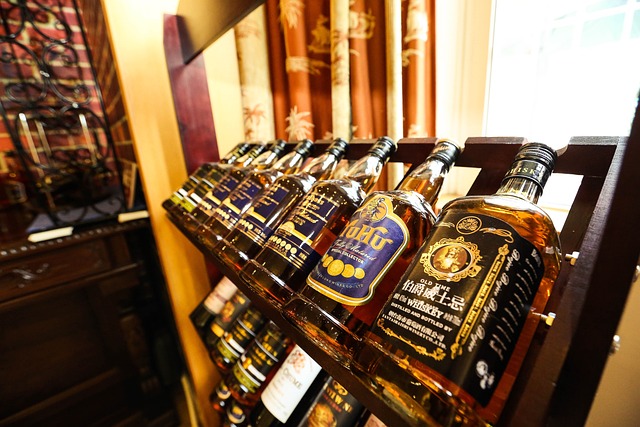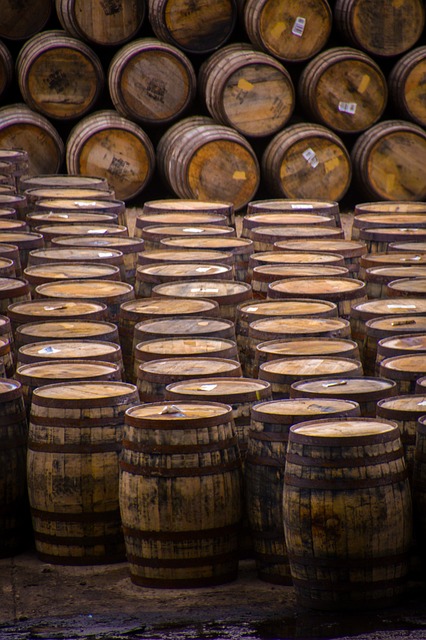Whisky cask investments are gaining popularity as a unique alternative asset. Over the past five years, the market has grown by 12.4% annually, with some distilleries seeing even higher returns. As casks age, their value often doubles every five years, offering long-term potential for significant gains.
Global demand for whisky, particularly in Asia and America, is driving up prices and making well-aged stocks harder to find. In 2018, the U.S. became the first country outside the UK to import over £1 billion worth of Scotch whisky, further boosting the value of casks.
Unlike stocks or bonds, whisky casks are a tangible asset that improves in quality and value as they age. This makes them highly desirable among collectors and investors, providing stability and resilience during economic fluctuations.
Stay with us as we dive deeper into the unique benefits of whisky cask investments and how they compare to traditional assets.

Understanding the Whisky Cask Market
Scotch whisky exports now make up over 20% of the UK’s food and drink exports, worth £4.91 billion last year. This growth has made whisky cask investments more popular, with the market valued at $40 million by IWSR.
Investor interest in the whisky cask market is rising. Investors put €7.8 million into cask whiskey through Whiskey Wealth Club in early 2020. This more than doubled the previous year’s amount. This growth is because of the chance for high returns, with estimates suggesting a 16.1% annual return.
Cask maturation plays a critical role in determining whisky value, with 80% of maturation happening in casks before bottling. Investors often hold casks for 5–10 years, with 10-year storage plans commonly included in portfolios to maximize returns. With 143 distilleries across six regions and diverse investment options ranging from £5,000 to £50,000, whisky casks offer flexible entry points.
Cask maturation plays a critical role in determining whisky value, with 80% of maturation happening in casks before bottling. Investors often hold casks for 5–10 years, with 10-year storage plans commonly included in portfolios to maximize returns. With 143 distilleries across six regions and diverse investment options ranging from £5,000 to £50,000, whisky casks offer flexible entry points.

The Appeal of Whiskey Cask Investment
Whiskey cask investment is becoming popular among smart investors looking for unique chances. It’s appealing because it could bring big profits as the whisky ages and gets more valuable. A rare cask whisky can increase in price by double every five years, making it a great long-term choice.
Investing in whisky casks offers a stable option compared to stocks or bonds. They are less likely to feel the impact of market fluctuations. This makes them a smart way to add variety to an investment portfolio.
Investors can also enjoy tax benefits in some places. In some countries, authorities don’t apply capital gains tax to whisky casks because they classify them as wasting assets due to evaporation. This can lead to big savings for investors when they sell their casks.
The whisky market is growing, especially in places like India. This growth is driving demand for top-quality casks. The global interest in whisky casks makes them more appealing, as it could push prices up and open new chances for investors to make money from market trends.

4 Benefits of Whiskey Cask Investment
Whisky cask investments have gained popularity due to their unique benefits, including value appreciation through aging and stability during economic fluctuations. They also offer tax advantages and come with diverse price points to suit different investors. Below, we’ll explore the key reasons why whisky casks make a compelling alternative investment.
1. Aging Process and Value Appreciation
Investing in whisky casks allows you to profit from the aging process. This process starts with a new make spirit, which must mature for at least three years to qualify as whisky. Distilleries often sell younger casks to generate revenue and support operations. As whisky ages, it becomes more complex and flavorful, increasing in value, with older whiskies, such as 20-year-olds, typically being worth more.
Investors benefit from several key factors:
- Long-term storage plans (typically 10 years) that allow whisky to appreciate
- High demand driven by the limited supply of premium whisky brands
- Consistent annual returns, with portfolios growing in value
- Ease of exit through pre-prepared liquidation strategies
With the whisky industry generating over £5 billion annually, cask investments offer stability and reliable growth, making them a smart choice for long-term investors.
2. Whisky Casks as a Stable Alternative Investment
Whisky casks have become a solid choice for investing in recent years. The Knight Frank luxury investments index shows that rare whisky has jumped by 564% in value over the last decade. This shows the strong potential of whisky casks for adding variety to your investments.
Unlike other investments, whisky casks have kept their value even when the economy was down. While Tesla’s stock fell by 26.5% in a year and Evergrande faced big problems, whisky cask ownership kept growing. This is because there’s not much of it around and Scotch whisky is getting rarer.
Here are some reasons why investing in whisky casks is a good idea:
- Natural value appreciation as the liquid ages
- Tax benefits, often not subject to capital gains tax
- Lower volatility compared to assets like cryptocurrency
- Portfolio diversification, reducing reliance on single investments
A study found that putting $100,000 into Scotch Whisky casks in July 2018 would have grown to $160,000 in two years. This beats many traditional investment options. So, whisky casks are a great choice for those looking to spread out their investments and lower risks.
3. Tax Benefits of Investing in Whisky Casks
Investing in whisky casks has special tax perks. In some places, people classify them as “wasting assets” because they don’t last forever. This can mean big tax breaks for investors.
One big plus is the chance to avoid capital gains tax. In the UK, investors might not pay taxes on profits from whisky cask investments. If the cask has a lifespan of 50 years or less, investors can avoid taxes. This is because of the ‘Angels’ Share’ – the yearly loss of 0.5 to 1.5% of the spirit.
Storing casks in bonded warehouses can also cut down on taxes. This way, investors pay duties and taxes only when they sell or bottle the cask. Selling a cask while it’s still in bond usually doesn’t mean paying taxes.
- Potential capital gains tax exemption
- Tax deferral through bonded storage
- No duties on casks remaining in bond
However, tax rules can vary by location. It’s important to consult tax professionals before investing in whisky casks to ensure compliance with local regulations.
4. Price Points and Investment Options
Whiskey cask investments offer a variety of options at different prices. You can start with entry-level casks for about $4,000. Bourbon casks, priced between $1,800 and over $4,000, have seen a growth of over 13% each year since 2010.
Scotch casks are more premium, costing from $2,600 to $8,000 or more. Their high price often shows the brand’s prestige and how much they can age. The distillery’s fame, the cask’s age, its size, and taxes also affect the price.
Cask investments have done better than stocks, gold, and Bitcoin since 2018. This success has drawn in investors looking for new chances. Australian whisky casks are now also catching eyes, offering new investment chances in the growing whisky market.
When thinking about cask ownership, keep these in mind:
- Cask volume can vary from 200 to 400 bottles
- Age greatly affects price and return potential
- Local sales and excise taxes impact costs
- Some platforms like CaskX are for accredited investors
With American whiskey sales up 10.5% in 2022 and the industry growing, whiskey cask investments are an interesting choice for diversifying your portfolio.
Comparing Cask Investment to Bottled Whisky
When looking at whisky investment, cask vs. bottled whisky shows different paths. Cask investments have special benefits over bottled ones. As casks age, they can grow in value. This can mean better returns than bottled whisky.
Cask investments need a longer wait. People usually keep casks for ten years or more for the best returns. Bottled whisky, on the other hand, offers more flexibility in when you can sell.
The initial cost for a cask is generally between £4,000 and £8,000, depending on the distillery and the age of the whisky, which typically ranges from 3 to 10 years. Bottled whisky prices, while variable, can also appreciate significantly over time. For example, the Macallan Private Eye, which sold for £36 in 1996, now holds a value of over £4,000.
Key considerations:
- Casks offer potential for higher returns due to continued maturation
- Bottled whisky provides more flexibility in investment timeframe
- Cask investments typically require a longer commitment
- Both options have shown significant value appreciation over time
Bottled whisky might be quicker to sell and easier to understand the market. But, cask investments bring their own perks, like true authenticity and easy storage in secure places. Your choice between cask and bottled whisky should match your investment goals and how much risk you can handle.

Top Whisky Types for Cask Investment
When considering premium whisky investments, choosing the right type of cask can significantly impact your returns. Different whisky types offer distinct advantages, from long-term appreciation to strong demand from collectors and enthusiasts.
Below are some of the top whisky types to consider for cask investment:
- Single Malt Scotch Whisky Casks (e.g., Macallan, Bowmore)
Collectors and investors highly regard these for their historical performance and popularity.
- Kentucky and Tennessee Bourbon Casks
With the whiskey market growing steadily, bourbon casks from these regions are becoming increasingly attractive for diversification.
- Irish Whiskey Casks
As the global whiskey market expands, Irish whiskey casks present strong growth potential.
- Highland Single Malt Casks (e.g., Glenmorangie, Dalmore)
Investors recognize Highland single malt casks, known for their quality, as reliable investments from prestigious distilleries.
- Limited Edition Releases from Prestigious Distilleries
These casks are highly valued due to their unique qualities or historical significance, often selling at a premium.
Key Factors To Consider in Whiskey Cask Investment
Getting started as a whisky cask investor means understanding several critical factors that can significantly impact the success of your investment. Here are the most important aspects to focus on when navigating the whisky cask market:
- Age and Volume of the Cask: Most whiskeys take 8 to 10 years to develop a rich flavor, and larger casks usually come with a higher price tag.
- Distillery Reputation and Historical Performance: A reputable distillery can significantly enhance the value of your investment over time.
- Security Measures and Regulatory Environment: Consider the security of the storage facility and review the legal landscape in the country producing the whisky.
- Exit Strategy Options and Tax Considerations: Plan how you will sell or bottle your cask, and take into account the tax implications, as these vary by location.
- Potential Risks and Market Fluctuations: Global conflicts, warehouse accidents, and regulatory changes can impact your investment, so diversifying across different whiskies and regions can help manage risk.
The Role of Whisky Investment Companies
Whisky investment companies are now big names in the whisky cask trading scene. They help with everything from picking casks to keeping them safe and in good shape. Their goal is to make it easier for investors to get into the market.
Some companies promise big returns, like up to 12% growth each year. One company even said whisky values went up by 478% over ten years. However, some have questioned these claims. The Advertising Standards Authority has blocked some ads for being misleading.
Experts call the whisky cask investment market a “gold rush”. This fast growth has raised worries about rules and being clear about information. The Scotch Whisky Association doesn’t control cask investments, so investors need to be careful.
When looking into whisky investment services, it’s important for investors to:
- Research the companies thoroughly
- Understand the complexities of cask ownership
- Be aware of potential challenges when selling casks
- Seek independent advice if necessary
As the market changes, there’s a push for more rules and honest advice in whisky cask trading. Investors should be careful and look for well-known firms with a good history in the field.
Risks and Challenges in Whisky Cask Investing
Investing in whisky casks can be thrilling, but it’s not without its risks. The market lacks rules, making it tough for investors. There’s no set price list or way to sell, which can lead to losses.
The value of whisky has changed a lot lately. From 2016 to 2021, the average UK whisky bottle price went up 4% a year. But, rare whisky prices fell 4% from June 2022 to 2023. This shows how unpredictable whisky investments can be and why you need to be careful.
Some companies might try to trick investors, hurting the industry’s good name. To avoid this, ensure you have the correct documents and that the warehouse keepers recognize them. Working with trusted companies like Stilnovisti is a good idea. They’ve been around since 2006 and keep your casks in safe, insured warehouses.
Key risks include:
- Lack of regulation in the market
- Market volatility and unpredictable returns
- Potential fraud from unscrupulous companies
- Importance of proper documentation and storage
It’s key to know the risks of cask investments before diving in. Being aware of the challenges can help you make smarter choices and protect your money in this unique market.
Emerging Opportunities in New World Whisky
New world whisky is making waves, attracting investors and fans. These distilleries are making unique spirits that break the mold. They offer exciting chances for those ready to dive in.
Artisanal cask selections from these new producers are rare and highly wanted. Many have already won awards and have a strong following. Early investors in these casks could see big returns.
New world whisky is not just new; it has a bright future. The demand for premium whiskies is growing, especially in places like India and China. These producers are in a great spot to tap into this market. Investors who jump on this trend early could see their assets grow in value.
Getting casks from these producers might be hard, but it makes them more special. As the whisky market changes, looking into new trends can lead to new chances for growth and diversification in investments.
From Cask to Cash: Master Whisky Cask Investment With Scotland Whisky
Whisky cask investment is a fascinating mix of tradition and opportunity, drawing in both collectors and savvy investors. As global demand continues to rise and the value of aged whisky grows, casks offer a unique alternative to more traditional investments.
But like any investment, it’s important to do your homework, stay on top of market trends, and be prepared for the long haul. For those willing to dive into the whisky world, cask investments can be an exciting and rewarding way to diversify and grow your portfolio.
Curious to learn more about maximizing your whisky cask investment? If you’re eager to dive deeper, uncover more tips on how to maximize your investment, explore the different types of casks available, and understand the nuances of this growing market. Visit Scotland Whisky to explore more articles, and take your whisky knowledge and investment strategies to the next level.